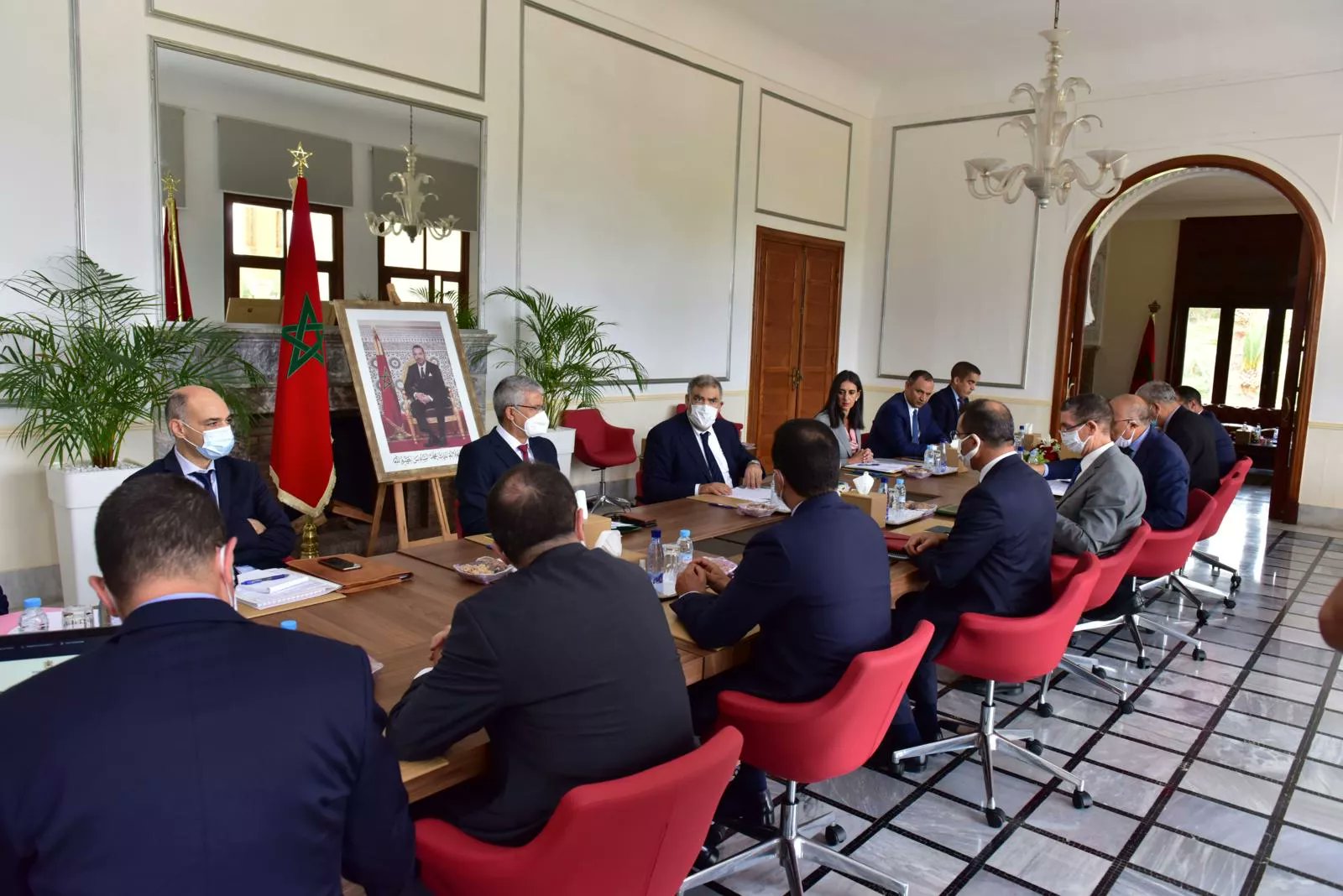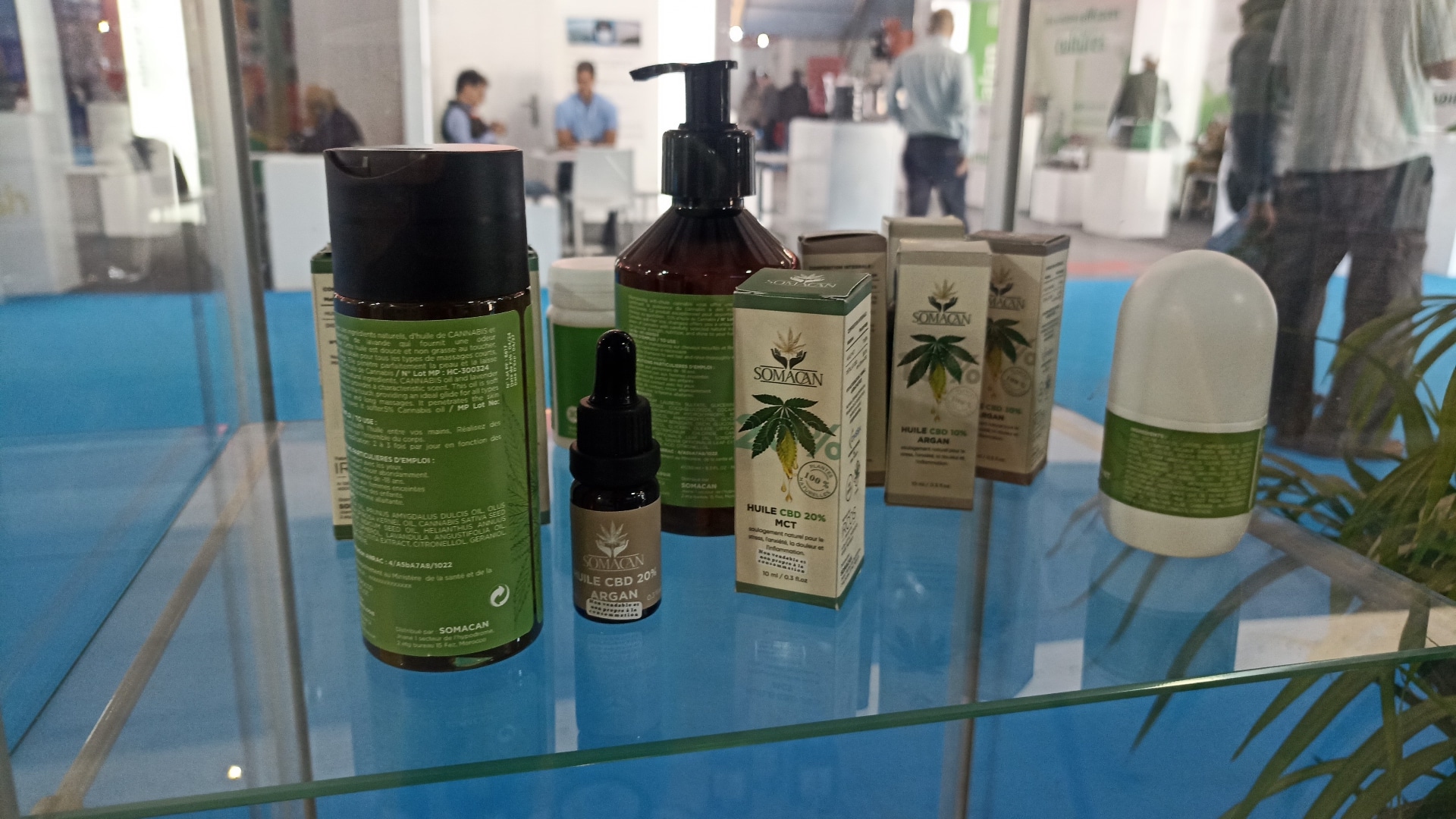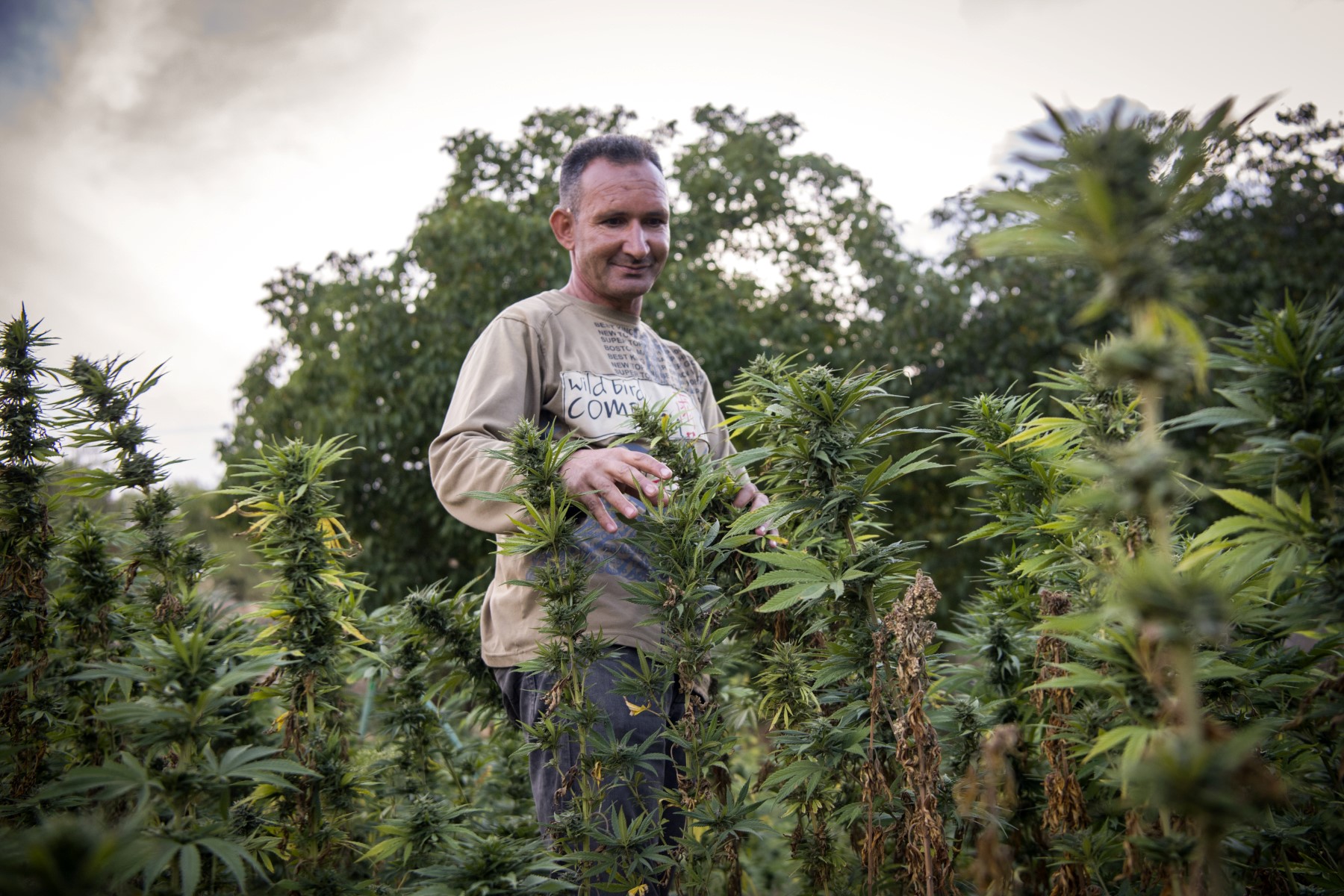A few years ago, this scenario was almost inconceivable. And yet, Morocco made it happen. It was almost three years ago, in July 2021. Law 13.21, regulating the legal uses of cannabis came into effect after a swift adoption by the government and both houses of parliament.
Since then, it has been supported by a whole legal framework including two implementation decrees, six ministerial orders, and three circulars and other decisions, aimed at specifying the scope and methods of its application. Today, everything is ready to begin the commercialization of the first finished products made from legal cannabis.
« We have just received approval from the DMP for 11 products that we plan to launch soon on the Moroccan market, » says Aziz Makhlouf, president of Biocannat.
« We have just received approval from the DMP (Direction du médicament et de la pharmacie, Department of Medicine and Pharmacy, under the Ministry of Health, editor’s note) for eleven products that we plan to launch soon on the Moroccan market, » says Aziz Makhlouf, president of Biocannat, in a conversation with TelQuel.
This cooperative is the first to receive authorization from the National Agency for the Regulation of Cannabis-Related Activities (ANRAC) for the processing and export of legal cannabis.
Located in Douar Béni Yabta, Bab Berred, in the Chefchaouen province, it is developing, in partnership with other operators, a whole range of products from cannabis flowers.
« We are not located in an industrial zone or in a city like Casablanca or Tangier, for example. We are truly situated on a mountain, in the heart of the Rif. There are many challenges and constraints to overcome, » he emphasizes. At the heart of local development, indeed.
The vendor’s journey
To secure the valuable license for marketing their products in Morocco, operators must undergo an entire process.
For finished cosmetic, therapeutic, and food products, operators who have already received authorization from ANRAC are required to obtain approval from the Ministry of Health.
“For finished cosmetic, therapeutic, and food products, operators who have already received authorization from ANRAC are required to obtain approval from the Ministry of Health. For example, if an operator wants to enter the cosmetics field, their factory must already be regulated. It must have health authorization and approval from the DMP (Direction of Medicines and Pharmacy) to produce the finished product.
To obtain registrations with the ministry, the operator must submit samples of their product for stability tests during the first, second, and third months of production, which are then sent to the DMP. The analyses must demonstrate that the products are stable and suitable for commercialization. A special committee from the DMP then meets to decide on the application,” explains a source at ANRAC.
A memo from the Ministry of Health, issued in October 2023, details the procedure for registering “cosmetic and personal hygiene products” over 24 pages. With this document, Khalid Aït Taleb’s department aims to ensure the “safe use of these health products while awaiting the development of specific legislation.” It also wants to ensure that products entering the national market pose “no risk to health.”

Zero tolerance
For example, cosmetic products must not contain any traces of tetrahydrocannabinol (THC), the main psychoactive component of cannabis responsible for its psychotropic effects. “This must be proven by analysis reports” issued by a laboratory recognized by ANRAC.
Advertisements for cannabis cosmetic products must not “create confusion with recreational cannabis.” Similarly, “any confusion in the claims used for the finished cosmetic product is prohibited.”
To obtain the registration certificate, operators must meet a comprehensive list of conditions and submit both an administrative and a technical file. Once obtained, the certificate is valid for a renewable period of five years.
Another joint circular from the Ministries of Health and Agriculture, published in November 2023, regulates the marketing of “foodstuffs and beverages intended for particular nutritional use.”
These are “foodstuffs that, due to their specific composition or unique manufacturing process, are distinctly different from common foodstuffs and beverages, meet the indicated nutritional objective, and are marketed to achieve this objective.”
Finally, for medical products, a circular released last March “specifies the nature of the concerned medicines and outlines the requirements for the composition of applications for market authorization of cannabis-based and/or derivative medicines.”
The goal is to ensure that “Moroccan patients” receive products in “strict compliance with national regulations and our country’s international commitments,” while ensuring “adherence to the quality, safety, and efficacy requirements inherent to any medicine.”
According to ANRAC, all this has been done in an “exceptional manner.” “Compared to other countries that have entered the same market, the first production only began in 2023, and today we already have the first product registrations,” our source explains, noting that significant groundwork has been done to encourage commercialization.
42 applications submitted
On the operators’ side, the enthusiasm is palpable. “In total, we have submitted applications for 33 products to the Ministry of Health, including dietary supplements, cosmetic products, and CBD oil. Eleven have been authorized by the ministry, and about ten more products are expected to follow in the next two weeks,” says Aziz Makhlouf.
Biocannat is not the only company to have submitted applications to the DMP. Health Innovation, a company focused primarily on dietary supplements, is the first to have received registration for two of its CBD-infused herbal teas.
According to its CEO, Abdelhay Akhiat, contacted by TelQuel, their commercialization in Morocco was expected to start in the third week of June. The company also plans to sell other dietary supplements in the form of drops, with CBD concentrations of 7% and 10%, starting from the same date.
Kyff, another brand supported by Oksa Green Tech, a company based in Rabat until recently and specialized in energy efficiency solutions, plans to market digestive, relaxing, and immune-boosting infusions starting in June 2024.
Milk and white chocolate bars containing 10% cannabis seeds are also expected to hit the market soon, in addition to the classic CBD flower products and vapes.
Milk and white chocolate bars containing 10% cannabis seeds are also expected to hit the market soon, in addition to the classic CBD flower products and vapes.
With the 2023 production, which ANRAC estimates at 294 tons, 42 registration applications have been submitted to the DMP so far. “These include 11 cosmetic products, two herbal teas, and dietary supplements. These applications have been submitted by two cooperatives and two operators. Of these 42 applications, the ministry has issued registration certificates for two herbal teas and 10 cosmetic products. Another application, which includes seven dietary supplements, will be reviewed by the DMP this week,” our source at ANRAC explains.
For the remaining applications, the Ministry of Health has requested additional analyses and information before making a decision. Only once these products are registered can operators begin production for the general public. It will take at least one to one and a half months before their products are available on the market.

Sale in pharmacies
“For now, we will work with pharmacists and wholesale pharmacists to start selling the first finished products made from legal cannabis in pharmacies.”
According to the agency, these products will be distributed only through authorized retail points. The goal is to tightly control the sales circuit to prevent any issues. “These products cannot be sold in large stores or fairs because it poses a risk. Illicit products could be mixed in, along with the trafficking that accompanies it,” emphasizes our source at ANRAC.
And they announce: “For now, we will coordinate with pharmacists and wholesale pharmacists to begin selling the first finished products made from legal cannabis in pharmacies. We will then evaluate how and where we can expand this.”
Operators in this attractive market are not just selling finished products. In addition to marketing these, raw production has already started, particularly for export. “When we talk about commercialization, we need to distinguish between the sale of raw production and finished products. For operators authorized by ANRAC, the commercialization of raw production can begin with the first harvest. Some have already started selling it in the form of dry material or resin, in compliance with national regulations and those of the destination country,” explains the agency.
“There are countries, for example, that require the THC content in resin to be below 0.2%, while others require it to be below 1%…” the same source adds.
Export in progress
“The first export was CBD paste. We sent it to Switzerland.”
Biocannat, the cooperative based in Bab Berred, began exporting its production last March. “The first export was CBD paste. We sent it to Switzerland. Morocco has exported a total of 55.5 kilograms so far, of which 50.5 kg belong to us. The remaining five kilograms belong to another operator,” says its president, Aziz Makhlouf.
He adds: “Today, the export process is tightly controlled with ANRAC and customs. Operations are conducted on a weekly basis. We started with a small quantity at first. We tested the circuit with 500 grams and then gradually increased to 5 kilograms, 10 kilograms, and then 20 kilograms.”
A specifications document, established by ANRAC with input from the relevant ministries and institutions, was made public in October 2022. The document defines the conditions for exporting cannabis and cannabis products of Moroccan origin made for industrial purposes.
It outlines the quality control standards for products, their packaging and preservation methods, environmental protection measures, safety obligations, traceability procedures, and the enforcement of the various clauses of the sector’s specifications. It is intended for “any legal entity wishing to be authorized to export cannabis and cannabis products made for industrial purposes.”
To do this, the entity is required, for example, to submit a declaration to ANRAC for each export contract and provide several details. The legal entity must specify the recipient of the sale, the delivery schedule, the identifiers of the cannabis varieties used, as listed in the ANRAC Seed and Plant Register, the quantities to be exported by destination country, the invoice and purchase order related to the export operation, and the analysis certificates for the exported batches, including, among other things, THC content.
The exporter is also required to “report immediately to ONSSA any detection of a harmful organism in the merchandise, or any reason to suspect such a presence.”
According to the head of the Biocannat cooperative, the export process is still carried out “easily” today, particularly to Switzerland.
A special authorization for transportation must also be obtained from ANRAC before the merchandise can be shipped abroad. According to the head of the Biocannat cooperative, the export process is still carried out “easily” today, particularly to Switzerland. “There are other countries that are currently opening up; we are working on that. I prefer not to disclose them right now because we have signed a few contracts, but we have not yet started the logistical processes to these countries. However, the process has definitely started,” he assures.
The construction and textile sectors in development
The commercialization of unfinished products can also occur between national operators. Some operators who have managed to produce, even though their processing facilities are not ready, sell their goods to others who have the required industrial setup.
Other operators are looking to enter the textile industry or the construction sector. For these industries, hemp is a particularly advantageous eco-friendly alternative. As early as November 2021, just a few weeks after the implementation of Law 13.21, the Moroccan Association of Textile and Clothing Industries (AMITH) addressed the issue.
This was during a press conference organized to present the roadmap for Moroccan textiles up to 2035. According to its president, Jalal Skalli, the legalization of cannabis is an “undeniable opportunity” for the sector. He notes that since the adoption of the law, textile operators are ready to go.
However, at present, this is not a priority for Morocco. “For the textile and construction sectors, special cannabis varieties are needed. These are not CBD varieties but fiber varieties with virtually 0% THC and 0% CBD,” explains our source at ANRAC.
“Moreover, a large quantity is required to enter this sector. Currently, the law allows it, but those who venture into textiles need large areas to accommodate the necessary mechanization, etc. It will certainly develop, but it won’t be in the first or second year of production. We need to wait until we have a significant biomass so that interested operators can utilize the waste and the dry material that is not usable in other segments,” she emphasizes.
So far, none of the authorized operators have made such a request to the agency. This year, ANRAC issued 2,905 authorizations: 2,737 to farmers and 168 to about 61 operators. “Of the 168 authorizations we granted to the 61 operators, there are 48 authorizations for industrial processing, one authorization for medical processing, 45 authorizations for commercialization, 39 authorizations for export, 7 authorizations for seed importation, and 28 authorizations for transportation activities,” details the same source.

Scaling up
“Farmers are increasingly interested. They have seen that it is profitable and that they no longer have any reason to stay in the illegal market.”
In 2023, 609 authorizations were issued, including 430 for farmers. “This reflects farmers’ acceptance, organization on the ground, and, above all, it shows that farmers are increasingly interested. They have seen that it is profitable and that they no longer have any reason to stay in the illegal market,” says ANRAC.
According to the agency, the production cost of one hectare is around 110,000 dirhams. “Farmers have embraced this because they know it will create wealth and jobs. For one hectare, there is a minimum of about twenty temporary workers, in addition to the permanent staff, who often are family members,” the source adds.
The agency estimates that the average selling price of a kilogram of legal cannabis by a farmer is now between 75 and 80 dirhams, compared to less than half that amount before legalization. *“The improvement is evident. Even farmers are starting to understand the social benefits behind it. They now know what CBD is and that it has no psychoactive effects,” notes our source.
What about recreational use? Could Morocco one day turn to this recreational market, similar to Germany’s decision in April ? “For now, it’s very clear; there is no recreational use in Morocco. Cannabis is solely intended for industrial and cosmetic purposes,” our source states. However, producers in Morocco can sell their resin to countries where recreational use is permitted, “but here, that is not the case.”
Voir cette publication sur Instagram
Green gold: a very lucrative market
In Morocco, cannabis is expected to be highly profitable for its cultivators and sellers. According to projections from the German portal Statista, which relies on statistics from data institutes, market research, and opinion studies, market revenues are projected to reach $241.20 million in 2024, equivalent to over 2.4 billion dirhams.
The revenues are expected to grow at an annual rate of 2.95% from 2024 to 2029, leading to a market volume of $278.90 million by 2029, or more than 2.7 billion dirhams.
On a global scale, the largest share of revenues will be generated in the United States, with an estimated $42.98 billion in 2024, according to Statista. The medical cannabis segment is expected to constitute the largest portion of these revenues, estimated at $222.60 million in 2024. For this segment, revenues are projected to grow at an annual rate of 3.01%, resulting in a market volume of $258.20 million by 2029.
These figures are far from the forecasts by Prohibition Partners, a think tank on cannabis decriminalization, which estimated in 2020 that Morocco could earn $944 million in the first year of legalization. However, this figure included recreational use, which is still prohibited in Morocco.
Written by Ghita Ismalli, edited in English by Eric Nielson




